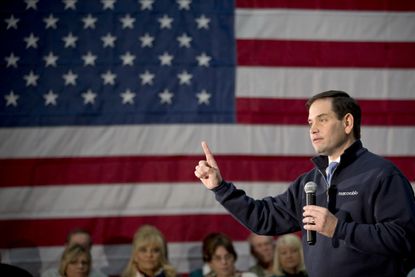Marco Rubio is a new kind of Republican. Really.
Here's why the 2016 wunderkind would be a modernizing force


Apparently Iowa Republicans don't want to make America great again. And that's just fine with the GOP elite, uttering a Monty Burnsian "excellent" over the prospect of Marco Rubio as the party's presidential nominee. The Florida senator is attracting new attention from donors and landing key endorsements in the wake of his third-place caucus finish. A strong showing in New Hampshire would further separate him from the other candidates in the "establishment" lane — Jeb Bush, Chris Christie, and John Kasich.
But given Rubio's support from what rival Ted Cruz might derisively call the "Washington Cartel," would he be a same-old, same-old Republican? The Week's Michael Brendan Dougherty writes that nominating Rubio would be "a statement that the party does not need a course correction." More pre-emptive wars for nothing, and tax cuts for free. Likewise colleague Damon Linker argues Rubio would be an even worse sequel to a pretty terrible film, that clunker being the Bush II presidency.
These are not crazy criticisms. Rubio is a hawk, and he does favor massively cutting taxes for rich people and business. Nothing new there for a Republican. But there is more to the Rubio story.
Subscribe to The Week
Escape your echo chamber. Get the facts behind the news, plus analysis from multiple perspectives.

Sign up for The Week's Free Newsletters
From our morning news briefing to a weekly Good News Newsletter, get the best of The Week delivered directly to your inbox.
From our morning news briefing to a weekly Good News Newsletter, get the best of The Week delivered directly to your inbox.
Think about it this way: What sorts of problems would a modern, forward-thinking Republican identify as America's big 21st century challenges? And what solutions would they propose? Such a person might see an economy where technology and globalization generate both opportunity and anxiety for the middle- and working-class. A slow rising tide doesn't seem to be lifting boats these days. While faster economic growth is necessary, it's not sufficient right now to provide broadly shared prosperity and security.
That would be a reasonable diagnosis, one more sophisticated than merely blaming "Obamanomics" for more than a decade of subpar income growth and continued high inequality. And that's pretty much what Rubio has been saying. And when it comes to solutions, a center-right policymaker accepting the above thesis might propose: 1. major tax relief for low-income Americans; 2. health care reform that covers more Americans with private insurance but at less cost than ObamaCare; 3. making higher-ed more affordable while providing more value; 4. updating Social Security to eliminate old-age poverty. and 5. supply-side tax and regulatory reform to promote innovation and economic dynamism. All of which Rubio is proposing.
But not all of Rubio's rivals are dealing as realistically with America's economic challenges, particularly those who would supposedly disrupt the GOP. Trump sells a moldy and fact-free economic nostalgia where tariffs will bring back jobs from Asia and mass deportations will lead to faster rising incomes. But at least there he's offering some sort of plan, as opposed to health care and education. Zip on those fronts. (Note: I do not consider a promise to "knock the hell" out of college costs to be a higher-ed plan.)
As for Cruz, he seems to blame Obama for pretty much all our ills. His health care plan ignores years of conservative wonkery on the issue. He's offered no higher-ed plan of any detail. And he wants to resurrect former President George W. Bush's Social Security privatization plan even though the math doesn't really work anymore. Cruz is super smart, by all accounts, but that intelligence is too rarely reflected in his policy ideas.
Rubionomics certainly has its flaws. For instance: His tax plan — for all its good points — loses trillions and cuts taxes too deeply for the rich, features sure to be politically treacherous if he's the party's nominee. Hopefully the next iteration of his plan will fix those flaws. And I would also like to see an explicit anti-cronyist agenda in areas such as banking, patents, and copyright. But at least he's not trying to bring back 1960s heavy-industry America, regurgitate 1980s Reaganomics, or substitute partisan talking points for serious policy.
Whatever Rubio's pros and cons as a messenger, his overall policy message shows the right path forward for the GOP.
Create an account with the same email registered to your subscription to unlock access.
Sign up for Today's Best Articles in your inbox
A free daily email with the biggest news stories of the day – and the best features from TheWeek.com
James Pethokoukis is the DeWitt Wallace Fellow at the American Enterprise Institute where he runs the AEIdeas blog. He has also written for The New York Times, National Review, Commentary, The Weekly Standard, and other places.
-
 The hunt for Planet Nine
The hunt for Planet NineUnder The Radar Researchers seeking the elusive Earth-like planet beyond Neptune are narrowing down their search
By Chas Newkey-Burden, The Week UK Published
-
 Magazine interactive crossword - April 26, 2024
Magazine interactive crossword - April 26, 2024Puzzles and Quizzes Issue - April 26, 2024
By The Week US Published
-
 Magazine solutions - April 26, 2024
Magazine solutions - April 26, 2024Puzzles and Quizzes Issue - April 26, 2024
By The Week US Published
-
 Arizona court reinstates 1864 abortion ban
Arizona court reinstates 1864 abortion banSpeed Read The law makes all abortions illegal in the state except to save the mother's life
By Rafi Schwartz, The Week US Published
-
 Trump, billions richer, is selling Bibles
Trump, billions richer, is selling BiblesSpeed Read The former president is hawking a $60 "God Bless the USA Bible"
By Peter Weber, The Week US Published
-
 The debate about Biden's age and mental fitness
The debate about Biden's age and mental fitnessIn Depth Some critics argue Biden is too old to run again. Does the argument have merit?
By Grayson Quay Published
-
 How would a second Trump presidency affect Britain?
How would a second Trump presidency affect Britain?Today's Big Question Re-election of Republican frontrunner could threaten UK security, warns former head of secret service
By Harriet Marsden, The Week UK Published
-
 'Rwanda plan is less a deterrent and more a bluff'
'Rwanda plan is less a deterrent and more a bluff'Instant Opinion Opinion, comment and editorials of the day
By The Week UK Published
-
 Henry Kissinger dies aged 100: a complicated legacy?
Henry Kissinger dies aged 100: a complicated legacy?Talking Point Top US diplomat and Nobel Peace Prize winner remembered as both foreign policy genius and war criminal
By Harriet Marsden, The Week UK Last updated
-
 Trump’s rhetoric: a shift to 'straight-up Nazi talk'
Trump’s rhetoric: a shift to 'straight-up Nazi talk'Why everyone's talking about Would-be president's sinister language is backed by an incendiary policy agenda, say commentators
By The Week UK Published
-
 More covfefe: is the world ready for a second Donald Trump presidency?
More covfefe: is the world ready for a second Donald Trump presidency?Today's Big Question Republican's re-election would be a 'nightmare' scenario for Europe, Ukraine and the West
By Sorcha Bradley, The Week UK Published